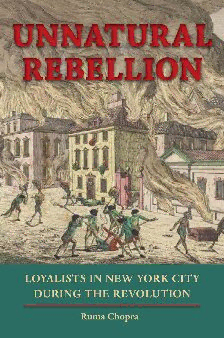
Unnatural Rebellion: Loyalists in New York City during the Revolution PDF
Preview Unnatural Rebellion: Loyalists in New York City during the Revolution
Unnatural Rebellion Jeffersonian America Jan Ellen Lewis, Peter S. Onuf, and Andrew O’Shaughnessy, Editors Unnatural Rebellion Loyalists in New York City during the Revolution Ruma Chopra University of Virginia Press charlottesville & london University of Virginia Press © 2011 by the Rector and Visitors of the University of Virginia All rights reserved Printed in the United States of America on acid-free paper First published 2011 9 8 7 6 5 4 3 2 1 library of congress cataloging-in-publication data Chopra, Ruma. Unnatural rebellion : loyalists in New York City during the Revolution / Ruma Chopra. p. cm. Includes bibliographical references and index. isbn 978-0-8139-3109-8 (cloth : alk. paper) — isbn 978-0-8139-3116-6 (e-book) 1. New York (N.Y.)—History—Revolution, 1775–1783. 2. American loyalists—New York (State)—New York—History. I. Title. e263.n6c56 2011 973.314—dc22 2010036114 To Prem and Hans, Kusum and Jia This page intentionally left blank Contents Acknowledgments ix Introduction 1 1. Natural Rights and Natural Ties: Britons in New York City 7 2. “Uncommon Phrenzy”: Rebel Usurpation, 1774–1776 29 3. “Quicken Others by Our Example”: New Yorkers Welcome the British 51 4. “Lord Pity This Poor Country”: Loyalist Resilience 80 5. “Diversity of Sentiments on the Future Conduct of the War”: Loyalist Clamor 108 6. “A Certificate of Their Necessity”: A Mix of Refugees and Rules 136 7. “The Die Had Been Cast”: Loyalist Divisions 160 8. “Look Yo Tory Crew, and See What George Your King Can Do”: Loyalists Unprotected 188 Conclusion: Loyalist Patriotism Exceeds Loyalist Power 223 Notes 227 Bibliography 271 Index 293 This page intentionally left blank Acknowledgments When I was a doctoral student at the University of California, Davis, Clarence Walker, in passing, observed that African Americans who chose enslavement over freedom in the antebellum period were neither irrational nor fearful. The slaves’ attachment to their masters required an alternate and deeper explanation. Alan Taylor emphasized the same with regard to the Euro-American loyalists’ allegiance to Britain during the era of the American Revolution. In a letter written from New York to her cousin in Scotland in May of 1785, the loyalist Nancy Jean Cameron acknowledged the compelling emotions that drove colonists to choose British patriotism over rebellion: “Patriot or rebel we are what we see is right to each of us, conscience may make cowards.” I am thankful to Clarence, Alan, Mrs. Cameron, and to other voices that echo from the archives, all of which have taught me to consider how people make sense of their lives. Alan is brilliant. His deep commitment to scholarship and to his stu- dents is unsurpassed. If mentors indeed lead by example, there is no higher standard. Clarence attends to the entire world without missing a single nuance. His friendship—his loyalty—has meant everything. From the beginning, other members of my graduate committee, John Smo- lenski and Caroline Cox, oVered their guidance. John showed a cultural studies student how to read history, and Caroline taught that student how to feel less intimidated writing it. Other scholars provided friendship and also perspective. I am flattered when I am asked to place my work in relation to Judith Van Buskirk’s Gen- erous Enemies. Her warmth and goodness are, of course, legendary. Ronald HoVman of the Omohundro Institute inspired much-needed confidence with his kindness and sustained interest in the project. I could not have begun learning about colonial New York without Edward Countryman’s
